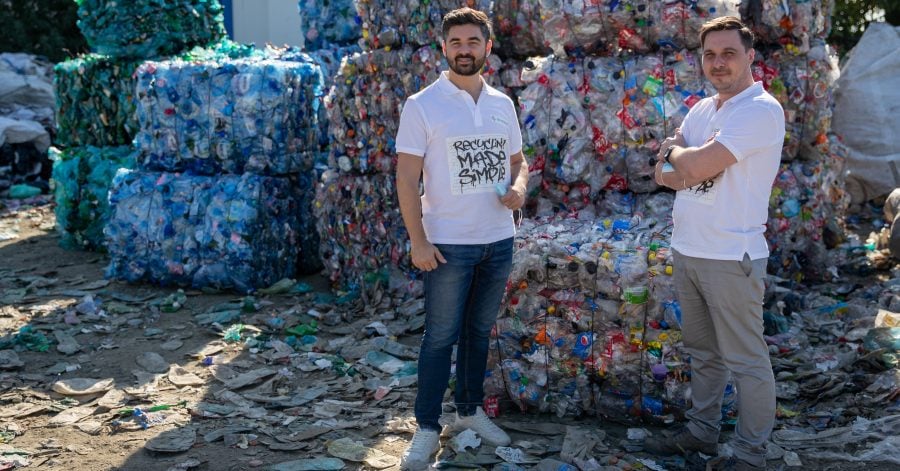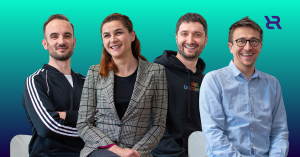Confirming the growing interest in the circular economy and recycling among local businesses and investors, Romanian startup EcoTree, the cloud software solution for waste management stakeholders, announced raising $500K (~€433K) in its second funding round. Sparking Capital leads the round and is joined by another existing investor, SeedBlink, as well as new business angels, including Cosmin Manea, founding partner of InstaShop.
Aiming to remove bureaucracy and increase transparency in waste management for businesses
The news follows the company’s first financing round of $250K last year, from Sparking Capital and SeedBlink, and brings the company’s total investment pool to $750K.
EcoTree was launched in 2017 by Bogdan Andronache (CEO), Alexandru Petrescu (COO), Marius Cirstea (Marketing Developer), and Dan Simota (CIT). Their mission is to digitize and automatize waste management processes, eliminating bureaucracy that slows down the process and increasing transparency.
Essentially, in the digital platform, waste generators can partner up with collectors and automatize the whole process, from contract creation to waste collection across all waste types. Collectors can also gain access to an extended market and save costs in terms of personnel and logistics. The platform further offers business intelligence modules for data analysis and reporting to ensure transparency and traceability along the chain.
When it comes to the environmental impact of their contribution in the waste management market, the company says they helped save up almost 2940 tons of CO2 from approximately 1000 tons of recycled waste intermediated by the platform in the first 10 months of 2021.
“For 2022, EcoTree aims to accelerate market penetration and expand its clients’ database, by targeting over 90 multinational companies from Retail, FMCG, Oil & Gas and Production accommodated in the platform. With this desired client pool, and over 90% paperwork reduction, transparency and traceability, we should increase their level of recycling by over 60%. This comes with the ambitious goal of saving at least 50K tons of CO2”, Bogdan Andronache, CEO and Co-founder of EcoTree, tells The Recursive.
Currently, 60 waste producer representatives, including Producer Responsibility Organisations have trusted the platform with managing all their waste operations. Also, 40 waste collection companies licensed for all waste types are registered on the platform.
With the fresh capital, the company plans to reach 100% digitalization of bureaucratic processes, and to export their business model in other countries, the CEO announced.
Struggling against stricter waste management EU directives
By 2030, the circular economy could present a $4.5 trillion economy global opportunity. One aspect of that comes down to recycling materials and products in a resource-effective way, in order to prevent waste accumulation.
Waste is a big issue on multiple fronts, leading to pollution and health-related issues. It is also an enduring challenge considering how long it stays in the ecosystem. The standard dose of aluminium has a lifespan of 100 years before eventually degrading, while PET can resist up to 450 years.
At the EU level, waste management targets are ambitious: 55% recycling of municipal waste by 2025 and 65% by 2035. For Romania, particularly, this is a challenging task, considering official statistics show the country was recycling only 12% of its municipal waste in 2019 (Ed.note around 5.4 millions tons of municipal waste were produced in 2018).
Where does most of the waste go? In landfills, which is actually the last alternative to waste management. Following an inspection by the National Environmental Guard in 2019, authorities discovered ~3.8K sites with uncontrolled landfills on an area of 1.4M square meters.
A key step towards recycling is separate waste collection, for which obligations exist since the adoption of Law no 211/2011 on waste management, but which failed to be implemented for years. The more recent Government Emergency Ordinance (74/2018) established new instruments for waste management, including the extended producer responsibility (EPR), often intermediated by Producer Responsibility Organizations.
Most recently, Romania, together with 13 other member states, was called by The European Commission, to bring the national legislation in line with the EU directive on the landfill of waste, which also seeks to limit the share of waste sent to landfills to 10%.
+++ For another read on waste recycling challenges and solutions in Romania, check out our interview with PolyMore, a startup offering automatic detection of wrongly sorted waste. +++








